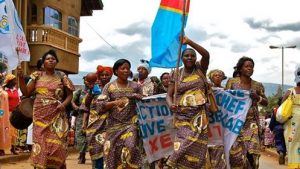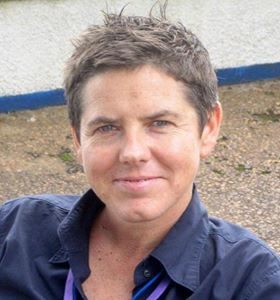
ANALYS Brigid Inder har i decennier arbetat för att stärka kvinnors rättigheter, främst inom civilsamhället, bl a i Kivu-provinsen i DRC. Hon har varit ordförande i den internationella kvinnorättsorganisationen AWID, Association for Women’s Rights in Development och särskild rådgivare till chefsåklagaren i den internationella brottsmålsdomstolen (ICC) där hon bl a arbetat mot straffrihet och för att ställa förövare av sexuellt våld inför rätta. I denna specialskrivna text för Mänsklig Säkerhet lyfter Brigid Inder fram arbetet med grovt sexuellt våld som upp uppmärksammats genom 2018 års fredspris. Artikeln fokuserar på Dr Mukweges arbete som gått ut på att både hjälpa överlevare av våldet och att lyfta frågorna internationellt. Fysiska och psykiska skador gör det svårt för kvinnorna att försörja sig, och att återvända till sina familjer efter det skambelagda de utsatts för. Texten pekar indirekt på Nadia Murads arbete; den unga yazidiska kvinnan som överlevt IS-slaveri och övergrepp och som delar priset med Mukwege. Genom sitt banbrytande arbete har Murad lyckats med det alla trott var omöjligt – att bryta stigmat kring det omänskliga våld som kvinnor utsatts för. Detta arbete kommer nu förhoppningsvis genom fredspriset att kunna spridas både till DRC och världen över.
Highly deserving recipient of the Nobel Peace Price 2018
Dr Denis Mukwege is a highly deserving recipient of the Nobel Peace Prize for his
important work providing medical support and reparative surgeries for rape-
related injuries to thousands of victims and survivors of sexual violence in South
Kivu, a conflict-affected province in the Democratic Republic of the Congo (DRC).
His efforts as a doctor and advocate for victims of sexualised violence, committed
predominantly against women, have helped to draw the attention of the global
community to the scale and impact of these crimes in the lives of women,
especially in the impoverished context of South Kivu. No female is exempt from
experiencing or witnessing violence in this province. Having worked in South
Kivu and eastern DRC with local women’s rights leaders and organisations for
more than a decade, I can attest to the widespread and brutal commission of
sexual and gender-based violence (SGBV) committed against elderly women,
babies and females of every age by marauding militia groups, the Congolese
armed forces and those taking advantage of the chaos generated by chronic
insecurity and ongoing conflict.
Local women’s rights organisations, including those I worked with, are
implementing programmes to identify victims of sexual violence in remote areas
of South Kivu, to provide victims with psychosocial support and assist them to
access medical care. On average, more than 85% of the 850 SGBV victims
assisted annually by our local partners required reparative surgeries for physical
injuries resulting from rape. The nearest medical centres are often inaccessible
and take several days to reach by foot, and the only specialist service in the
province capable of conducting the necessary surgeries is the centre at Panzi
Hospital, created by Dr Mukwege. This centre has saved the lives of thousands of
women and offered comfort and care in a hostile and unsafe environment.
Life is bleak for SGBV victims. In addition to the physical injuries and emotional
harm, there are also significant social and economic consequences. Women who
have been raped are often rejected by their husbands and families or are
considered unmarriageable by the community. The loss of family support pushes
women into ever worsening states of poverty for themselves and their children.
It is evident that choosing to remain silent about being a victim of sexual violence
is a form of self-protection from the both stigma and the ongoing consequences
of these crimes. Many in the community have lost confidence in the justice
system and SGBV victims often do not believe it to be worthwhile to report these
crimes to the authorities. The police are perceived to be unwilling or unable to
investigate acts of sexual violence due to the sheer volume of these crimes,
victim-blaming attitudes, and a lack of resources and capacity to effectively carry
out such investigations. Incidents that are investigated are often added to the
backlog of SGBV cases and those with the potential to progress through the
justice system are stymied when victims are unable to pay the court fees or are
unable to be located for their court appearance, due to the widespread
displacement of the population and the long period of time between the initial
reporting of the SGBV incident and the start of the court case. Dr Mukewege has
always been a willing and persuasive ally in working with local women’s rights
organisations on these issues and adding his distinguished voice to the calls for
justice, accountability and SGBV prevention.
Beyond the DRC, he took his experiences in South Kivu to world leaders and
became a compelling actor in the global movement to end sexual violence in
armed conflict.
By awarding this year’s peace prize to Dr Mukwege, the Nobel Committee has
provided a powerful message in tune with this historic moment and the growing
call for accountability for perpetrators of sexual violence, committed against
women every day in every country around the world. His deserving selection as
a Nobel Peace Laureate reminds us once again that exercising our individual
power in a collective space can generate a global conscience.

Brigid Inder, OBE
OBE, Former Executive Director, Women’s Initiatives for Gender Justice. Former Special Advisor on Gender to the Prosecutor of the ICC.
Vill du skriva en text där du kommenterar, diskuterar eller kritiserar detta inlägg? Kontakta ämnesansvarig redaktör.
Ansvarig redaktör: Gerd Johnsson-Latham, tf chefredaktör (ansvarsområden: kvinnors rättigheter, mänskliga
rättigheter, våldsbejakande nationalism, klimat)
(Texten har redigerats sen publicering)

Lämna ett svar